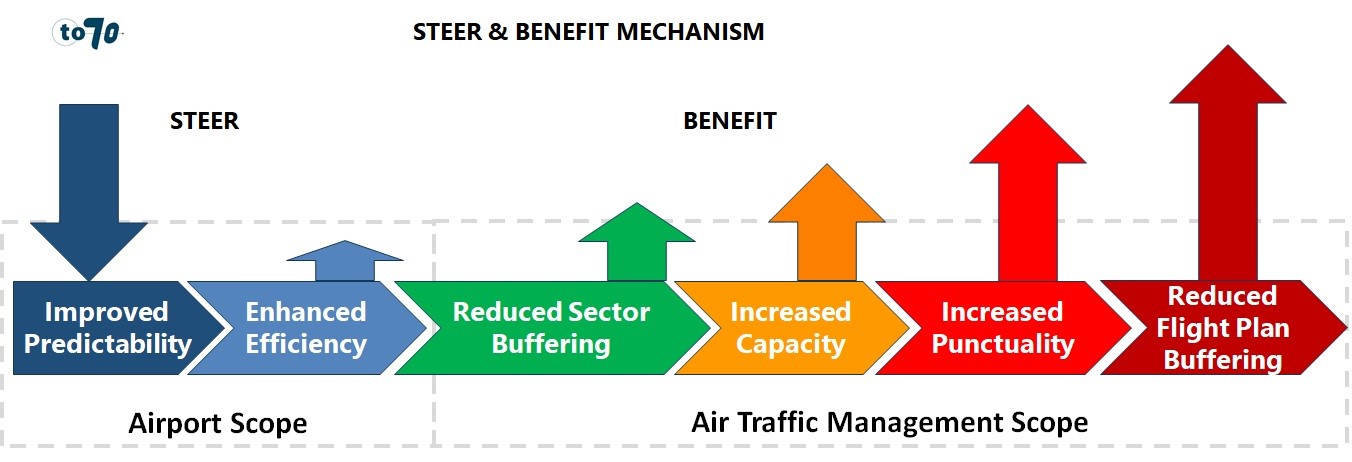EUROCONTROL and many of the European airports that utilise Airport CDM have adopted the concept of ‘Best Planned, Best Served’ in their operational procedures for the airlines. The aim is to boost adherence to procedures and targets, yet few airports actively monitor and steer on this performance. We believe it is time for a European performance monitoring methodology that would level the playing field for all stakeholders.
[blockquote text=”Harmonized Performance Monitoring methodology utilised by all stakeholders across Europe could contribute to a level playing field.” text_color=”#004361″ show_quote_icon=”yes”][vc_separator type=’transparent’ position=’center’ color=” thickness=’5′ up=” down=”]
Reliable Predictions, Smoother Service
It is no secret that delays cost the airline industry enormous amounts of money. Airport Collaborative Decision Making (Airport CDM) is one integral way the aviation industry is improving predictability and efficiency, thereby contributing to punctuality and potentially reducing block times in flight plans.
For Airport CDM to be effective, however, airports also need airlines, their ground handling partners and ANSPs to provide reliable flight predictions and adhere to them as closely as possible. Better adherence to procedures and targets enables enhanced efficiency of aircraft operations.
The more reliable the planning, the easier it is for all partners involved to provide a smoother service with less need for buffering and ATFM regulations. EUROCONTROL calls Airport CDM a step forward from “first come, first served” toward “best planned, best served” (pdf, see p.56).
Predictability Incentives
The benefits from Airport CDM for all stakeholders depend heavily on performance monitoring and being able to steer on deviating behaviour. Under the concept of Best Planned, Best Served, airlines and ground handlers that perform best to their predictions could receive preferential service. However, many CDM airports have yet to implement Stakeholder Performance Monitoring to be able to fully apply this concept.
A performance monitoring methodology utilised by all stakeholders across Europe could make effective monitoring and comparison easier. A harmonized set of performance indicators and organisational guidelines would greatly enhance the reliability of predictions and reduce the need for ATFM regulations. To make the concept even more effective in changing stakeholder behaviours and actions that cause unpredicted delays and uncertainties, it would also require an acceptable and easy to apply combination of incentives and sanctions.
Incentives and sanctions can be considered in terms of both financial discounts and time buffers, as illustrated in these examples:
- A certain airline notoriously spends more time occupying the runway after landing. The extra buffer time needed behind these aircraft means total landing capacity is reduced. Lower ATC fees provide a good incentive to reduce runway occupation times.
- Another airline often misses its aircraft ready time with the TOBT window. Hence, the airline receives structural TSAT buffer time sanction to accommodate for poor TOBT adherence.
Case For Harmonised Performance Monitoring
Airports could monitor and report on performance over time and apply incentives and/or sanctions as defined in their performance monitoring policy to reduce demand-capacity imbalances. Performance monitoring removes unfair burdens on other airlines and creates a more level playing field where chronically poor predictions and performance become a competitive disadvantage. Aviation organisations can collaborate to determine acceptable incentives that benefit all stakeholders. Change toward enhanced predictability is essential, and incentives can help improve stakeholder buy-in. Application at European network scale would enable a level of predictability that provides real benefits in network capacity, airport capacity and airline punctuality.
Harmonized key performance indicators for all airports, ANSPs, ground handlers and airlines would help to align network-wide reports, avoid interpretation errors and enable coordinated discussion around performance improvement measures. In addition, standardised data collection and monitoring would simply the comparison of CDM to non-CDM operational effectiveness.
About To70. To70 is one of the world’s leading aviation consultancies, founded in the Netherlands with offices in Europe, Australia, Asia, and Latin America. To70 believes that society’s growing demand for transport and mobility can be met in a safe, efficient, environmentally friendly and economically viable manner. To achieve this, policy and business decisions have to be based on objective information. With our diverse team of specialists and generalists to70 provides pragmatic solutions and expert advice, based on high-quality data-driven analyses. For more information, please refer to www.to70.com.


